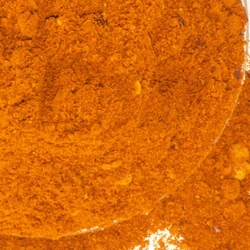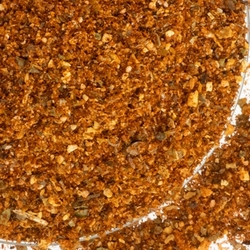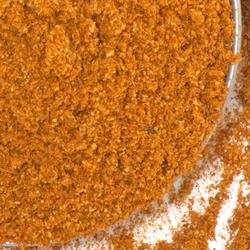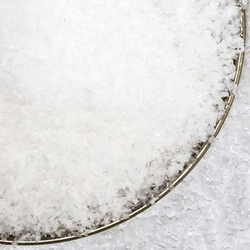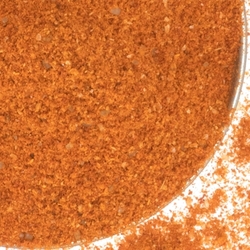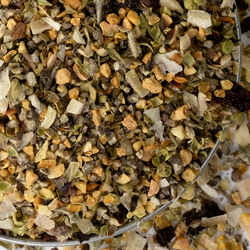
As I have mentioned several times before, I eat a lot of chicken. While I love to slow cook, roast, cook in a solid cast iron skillet, or from time to time use a wok, my most preferred method for cooking chicken is the grill. Over the years I've also tended to prefer salt free seasonings for my chicken. Because of this, my palate is particularly sensitive to salt even in the tiniest amounts.
So why would someone who prefers salt free seasonings for their chicken suddenly do a 180 and become completely infatuated with dry brining using salt? Well, that is because one of my favorite things to do is research different ways of cooking to discover the variety of ways other people season their food. You never know exactly when a rabbit hole is going to open and just suck you down into it. This was absolutely the case when I came across Samin Nosrat's book Salt Fat Acid Heat. I tend to eat very clean and am a bit fanatical about working out, so I have shied away from adding too much additional salt or fat to my daily meals. Her book did the previously thought to be impossible; it changed the way I look at using salt and fat in my food.
The Food Lab by Kenji Lopez-Alt was a second book that influenced me to push myself out of my comfort zone. This leads me back to that rabbit hole. My journey started innocently enough. As I was reviewing our turkey brining recipes for the upcoming Thanksgiving holiday season in September of last year, I was simultaneously reading these two books. My interest in salt was initially sparked by Samin's book, but Kenji really pulled me in with his scientific approach to various wet brines vs dry brines (spoiler alert: he's really not a huge fan of brining your turkey at all).
This made me want to do another round of brine testing myself, but with chicken and not turkey. I started with a wet brine. Over a period of two weeks, I tried several different wet brine recipes a total of 7 times (I tend to cook chicken 3 to 4 times a week). They definitely made my chicken breasts appear to be moister after grilling, but they also tended to be a bit mushier as well. So, did they do a better job of retaining moisture or were they just holding the water because they had been submerged in a wet brined salt/ sugar water concoction for 8-12 hours, forcing more moisture into them to begin with?
Next, I was on to a dry brine. Over the next three weeks (for those keeping score at home that meant 11 more tests), I tried a dry salt brine along with my normal rotation of different seasoning blends (Berbere, Shawarma, Flippin' the Bird, Montreal Chicken Seasoning, etc). To say I was blown away would be an understatement. Hands down this was the way to go. The flavor was nothing short of amazing.
What Does a Dry Salt Brine Do?
First, the salt draws out the meat juices through osmosis. Secondly, the salt dissolves into the juices, essentially turning into a "natural" wet brine even though there isn't any added liquid. Finally, this brine is reabsorbed into the meat and starts breaking down tough muscle proteins, resulting in juicy, tender, seasoned meat.
What Type of Salt to Use
You should always use a large crystal salt to dry brine - most often this is a high quality kosher salt. Regular table salt has much smaller crystals and it is too easy to over salt or for the salt to fall off your meat.
I've also used a Fluer de Sel salt that worked fine, but it is much more expensive than Kosher salt so in my opinion not worth the added expense.
Choose Your Blends Wisely
During these numerous tests I always seasoned using one of our various chicken seasonings. I still seasoned as usual - typically 1 tablespoon of seasoning per pound of breasts or thighs. I tended to prefer using blends that had little to no salt in them instead of those that were heavier in salt (i.e. Nashville Hot Chicken).
What I Learned Brining 50 Pounds of Chicken
I tend to cook either skinless chicken breasts or thighs, and naturally I learned quite a bit through my experiments. I would say you should salt and then apply the seasoning to one side of the meat before flipping over and repeating on the other side. When I tried seasoning first and then salting I found that too much of the salt fell off when turning the bird over.
While you must experiment with how much salt to use, you'll most likely end up adding a bit more salt than you think that you need. Out of the 11 dry brine tests I did, only twice did I feel that I over salted the chicken. Three or four times I felt that I didn't salt enough. One of the two times that I felt that I over salted I had used one of our blends that was not a salt free seasoning, so I do suggest sticking to those seasoning blends that are salt free.
I experimented with letting the dry brine marry with the meat in the fridge for 4,6,8 and 12 hours and felt that optimum flavor for me was in the 6 to 8 hour range.
For best salt coverage I found that putting salt in the palm of my hand, loosely closing my fist and then turning my hand palm side down while shaking my hand from side to side allowed for the best even coverage. If you drop salt from higher up, you will allow the salt to fall in a natural arc and be more evenly distributed. When I applied the salt using the pinch method it led to inconsistent coverage and pockets of salt.
While I did favor the grill for cooking my chicken during these various tests, I also oven roasted and cooked in a cast iron skillet for two of the tests with the same types of juicy, flavorful results.
Bottom Line
Individual results may vary. We all have different tastes and flavoring preferences, so you really will need to experiment a bit yourself. Add different amounts of salt and seasonings and test for yourself how long to let the brine sit on the chicken before cooking to best suit your unique taste.
I think that I have now been cured of Halophobia (the fear of salt and salty foods). While I don't anticipate exclusively using a salt brine every time I'm cooking chicken, I will certainly keep this a regular part of my chicken seasoning arsenal going forward. It's a great change of pace.


